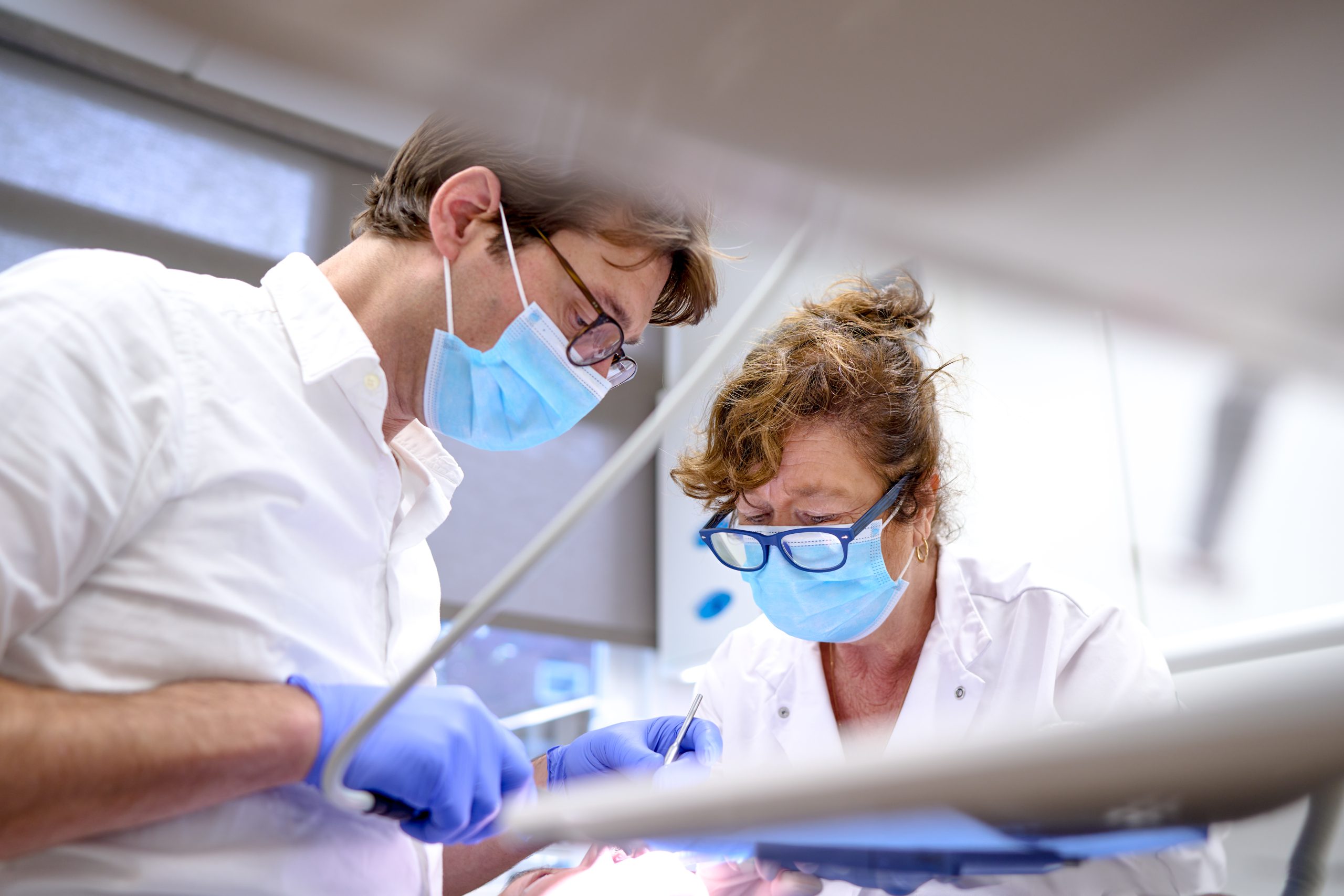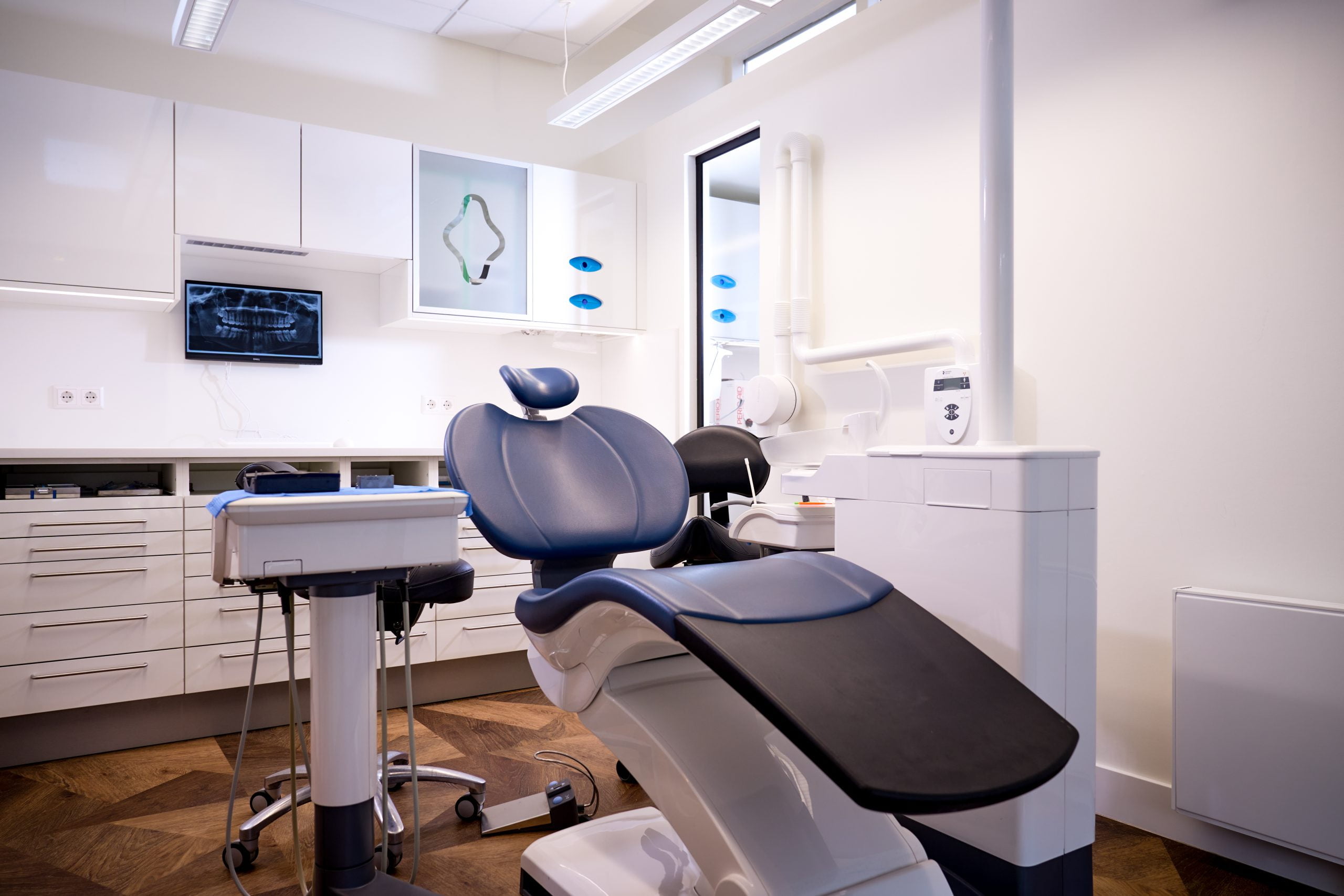Implantology
Dental Practice Johan HuizingalaanImplantology is a branch of dentistry that deals with replacing missing teeth with dental implants. A dental implant is a titanium screw placed in the jawbone, acting as an artificial tooth root. A crown, bridge or prosthesis can then be placed on the implant.

Why have implants placed?
There are several reasons why people choose to have implants We’ve listed a number of common reasons for you:
- Aesthetics: Firstly, implants can help replace one or more teeth or molars, improving the aesthetics of your teeth. This can increase your self-confidence and improve your quality of life.
- Function: In addition to the fact that your teeth will look aesthetically better, the function of your teeth will also improve. When you don’t have all of your teeth, it can sometimes be more difficult to eat and/or talk.
- Alignment teeth: Another reason to have implants is to fill open gaps to prevent neighbouring teeth or molars from moving towards them. The implants ensure that the alignment of your teeth is maintained, reducing the chance of future dental problems.
- Retention of bone mass and structure: Implants can help maintain bone mass and structure in the jaw, which can decrease after tooth loss. By implanting the artificial tooth roots in the jaw allows the bone to bond to the implant and prevent the jaw from shrinking.
- Stabilization of prosthesis: In closing, implants can also help by stabilising dental prosthesis, whereby the comfort and functionality of the prosthesis are improved
Overall, therefore, it can be said that implants help improve the overall health of your mouth and teeth and can provide a lasting and effective solution to dental problems.

Different types of implants
At our dental practice in Amsterdam, we offer different types of implants. The following implants can be used to replace a single tooth to a complete set of teeth:
- Single implant: A single dental implant consists of a titanium screw that is placed in the jaw bone and then covered with a porcelain crown that looks and feels like a natural tooth.
- Multiple implants Multiple dental implants can be used to support a bridge, whereby, multiple missing teeth can be replaced.
- Complete prosthesis: With dental prostheses a variety of implants are strategically placed in the jaw, allowing the prosthesis to be firmly secured and improving comfort and functionality.
The type of implant that is most suitable for you, depends on your specific dental situation. You can think of the number of missing teeth, your gums and jaw bone health, and the aesthetic and functional goals you want to achieve. Your dental-implantologist can help you decide the best option for your needs and situation.
Having implants placed
The treatment plan for placing implants may vary depending on your specific dental situation. Below you will find a general overview of what your treatment plan will look like:
Step 1: Consultation and indication of your health
The first step in the treatment plan is a consultation with your dental-implantologist. During this meeting, the options will be discussed with you. Your overall (oral) health will also be examined.
Step 2: Diagnosis
To establish a diagnosis, an orthopantomogram (OPG) will be made. This is an X-ray photo that maps your jaw, jaw joints and teeth. In addition to this, in some cases, a CBCT scan is carried out. This is a 3D X-ray.
Step 3: Placing the implants
When it has been determined that you qualify for implants, these can be placed during the following step in the jawbone. This occurs under local anaesthetic. The dentist makes an incision in the gums and drills a hole in the bone, after which the implant is screwed into the bone. The gums are then sutured.
Step 4: Recovery
After the implants are placed, it is important to give the implants time to heal and integrate with the jawbone. After 7-10 days, you’ll return to our practice, and the sutures will be removed. The dental implantologist will also check whether the healing is progressing as it should.
Step 5: Placement of the definitive prosthesis
After a waiting period of about 10-12 weeks, the healing process should be completed, and your final dental prosthesis can be placed. This can be an individual crown, a bridge or a complete prosthesis.
Step 6: Aftercare and maintenance
Finally, it is important to ensure good oral hygiene and visit our practice regularly for periodic checks. This helps to extend the life of the implant and prosthesis.
The Cost of dental implants
When you plan to have dental implants placed, you probably want a clear idea of the costs involved in advance. The costs of dental implants really depend on your personal situation and the number of implants that you have placed. Below you will find some common costs so that you can make an estimate of the costs yourself. You will of course receive a detailed quote during your appointment with the dental implantologist.
| X22 | The making and assessing a jaw overview photo for implantology in the toothless jaw | €91,04 |
| J001 | Overhead costs of implants and peri-implantitis surgery | €220,32 |
| J010 | Research for the purpose of determining the needs assessment for implantological treatment | €83,23 |
| J040 | Placing of the first implant per jaw | €293,22 |
| J057 | Cost of implant | €404,40 |
For more information about the costs of our dental treatments, we refer you to our page about our rates.

Implants via health insurance
Generally, implants are not reimbursed from basic health insurance. If you would like to be eligible for reimbursement, you must have additional dental insurance. (Aanvullende tandartsverzekering). The amount reimbursed by your health insurance depends on the type of insurance you have and by which health insurer provides your coverage. If you want to take out additional insurance for your teeth, it is therefore wise to compare the different dental insurance policies carefully.
Implantologist Amsterdam Nieuw-West
Are you looking for a specialised dental-implantologist in Amsterdam Nieuw-West? Then you’re at the right place at Dental Practice Johan Huizingalaan. Our team consists of multiple dental-implantologists, so you can simply visit our dental practice in Amsterdam for your treatment. Our professionals are also available in the evenings and weekends, so you can always schedule an appointment at a time that suits you. Are you not yet registered with us? Registration can be easily completed on our website. We hope to welcome you soon to our practice.
Frequently asked questions implantology
Can a dentist place implants?
Only specialized dental implantologists, or dental surgeons, are allowed to place implants. Fortunately, multiple dental-implantologists work at our dental practice in Amsterdam Nieuw-West. You can therefore simply visit our dental practice for the placement of the implants.
How long does an implant last?
If you look after your implants, these can last for many years. However, for the life of your implant, it is important to practice good oral hygiene.
Do I have to take anything into account after the placing of implants?
There are several things to keep in mind after having implants placed to ensure they heal properly and to prevent complications. Below we list some important things to keep in mind:
- Follow the instructions of your dental-implantologist on: Your dental-implantologist will provide specific instructions on how to look after your implants and what you should and shouldn’t do during the recovery period. It’s important to carefully follow these instructions to promote the healing process and prevent complications.
- Avoid hard or chewy foods: During the first couple of days after the placing of the implants you need to avoid hard or chewy foods. This will probably occur naturally, as it can be painful to eat these things. Besides that the recovery process can be delayed or complications can arise as a result.
- Clean and floss your teeth carefully: To prevent bacteria from accumulating around the implants and causing infections, it is important to brush and floss your teeth and implants carefully.
- Avoid smoking and alcohol: Smoking delays the recovery process and can lead to the implants not growing properly. Besides that, you should drink a little or preferably no alcohol, in view of the fact that it is also bad for the recovery process of the wound.
Can I eat everything with implants?
After implant placement, you should be careful about what you eat and drink during the first few months when your jawbone is still recovering so as not to disturb the healing process. Once the implants have grown firmly into the jawbone, you can eat everything you would normally eat with your natural teeth. Do you have doubts about certain foods? Then you can always contact us.
Is it painful to have an implant placed at your dental practice in Amsterdam?
The treatment itself is painless. You will receive a local anaesthetic beforehand. When the anaesthesia has worn off after the treatment, you may experience some after-pain. This pain can be suppressed with pain killers.